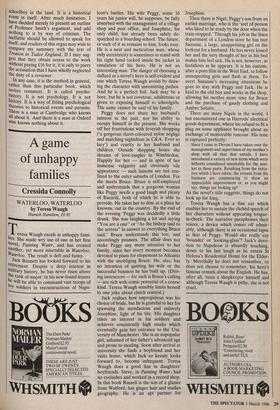A game of unhappy families
Cressida Connolly WATERLOO, WATERLOO by Teresa Waugh
Hamish Hamilton, f9.95
Teresa Waugh excels at unhappy fami- lies. She made wry use of one in her first novel, Painting Water, and has created another, yet more miserable in Waterloo, Waterloo. The result is deft and funny. Jack Bennett has looked forward to his retirement. Despite a deep interest in military history, he has never risen above the rank of major: in his new-found leisure h, e Will be able to command vast troops of Loy soldiers in reconstructions of Napo- leon's battles. His wife Peggy, some 16 years his junior will, he supposes, be fully absorbed with the management of a village shop and post office, and Josephine, his only child, has already been safely de- spatched to a boarding-school. The future, or such of it as remains to him, looks rosy. He is a neat and meticulous man, whose only eccentricity is sometimes to stand with his right hand tucked inside his jacket in emulation of his hero. He is not an interesting man. The danger of choosing a dullard as a novel's hero is self-evident and one which Teresa Waugh avoids by draw- ing the character with unremitting pathos. And he is a perfect foil. Jack may be a bore, but he is not covetous, adulterous or given to exposing himself to schoolgirls. The same cannot be said of his family.
Peggy does not share her husband's interest in the past, nor his ability to occupy himself in the present. She works off her frustrations with feverish shopping Ca gorgeous claret-coloured nylon neglige and matching nightdress in C&A. Ever so lacy') and cruelty to her husband and children. Outside shopping hours she dreams of love-tangles in Wimbledon.
Happily for her — and in spite of her immense vulgarity and obviously vile appearance — such liaisons are not con- fined to the outer suburbs of London. For she meets Bruce. Bruce is self-employed and understands that a gorgeous woman like Peggy needs a good laugh and plenty of Bacardi, both of which he is able to provide. He takes her to dine at a place he knowns, out in the country. By the end of the evening 'Peggy was decidedly a little drunk. She was laughing a lot and saying "You are a one" or "As the bishop said to the actress" in answer to everything Bruce said.' Bruce understands this too, and accordingly pounces. The affair does not make Peggy any more attentive to her family, since her every moment becomes devoted to plans for elopement to Alicante with the unobliging Bruce. He, alas, has no intention of quitting his wife or the successful business he has built up. (Driv- ing instructors — for such is Bruce's calling — are rich with comic potential of a coarse kind. Teresa Waugh sensibly limits herself to one joke about clutch control.) Jack realises how unpropitious was his choice of bride, but he is grateful to her for spawning the mendacious and unlovely Josephine, light of his life. His daughter takes an interest in his soldiers and achieves consistently high marks which eventually gain her entrance to the Uni- versity of Manchester. She is an unpopular girl, ashamed of her father's advanced age and prone to stealing. Soon after arrival at university she finds a boyfriend and her visits home, which Jack so keenly looks forward to, become infrequent. Teresa Waugh does a good line in daughters' boyfriends. Steve, in Painting Water, had no eyelashes and worked in a record shop. In this book Russell is the son of a glazier from Watford, has ginger hair and studies geography. He is an apt partner for Josephine.
Then there is Nigel, Peggy's son from an earlier marriage, who is the 'sort of person who liked to be ready by the door when the train stopped.' Through his job in the linen department of a London store he has met Suzanne, a large, unappetising girl on the lookout for a husband. He has never kissed her and the very thought of her in his bed makes him feel sick. He is not, however, as fastidious as he appears. It is his custom, after a porn film in the West End, to follow unsuspecting girls and flash at them. To avert Suzanne's increasing attentions he goes to stay with Peggy and Jack. He is kind to the old boy and works in the shop, allowing his mother more time for Bruce and the purchase of gaudy clothing and Ambre Solaire.
There are many Nigels in the world. I last encountered one in Harrods' electrical goods department, where his refusal to fit a plug on some appliance brought about an exchange of memorable rancour. His tone is captured perfectly: Since I came to Devon I have taken over the management and supervision of my mother's shop with all that that entails. I have introduced a variety of new items which were hitherto considered unsuitable for the mar- ket in these parts. Resulting from the initia- tive which I have taken, the returns from the business are commencing to show an appreciable improvement or, as you might say, things are looking up!
As the novel's title suggests, things do not look up for long.
Teresa Waugh has a fine ear which enables her to sustain the cliched speech of her characters without appearing tongue- in-cheek. The narrative paraphrases their voices, a device which comes off admir- ably, although there is an occasional lapse in that of Peggy. Would she really say `bounder' or looking-glass'? Jack's devo- tion to Napoleon is absurdly touching, down to his last laugh as he enters St Helena's Residential Home for the Elder- ly. Mercifully he does not remember, or does not choose to remember, his hero's famous remark about the English. He has, after all, been a shopkeeper himself and although Teresa Waugh is pithy, she is not cruel.














































 Previous page
Previous page